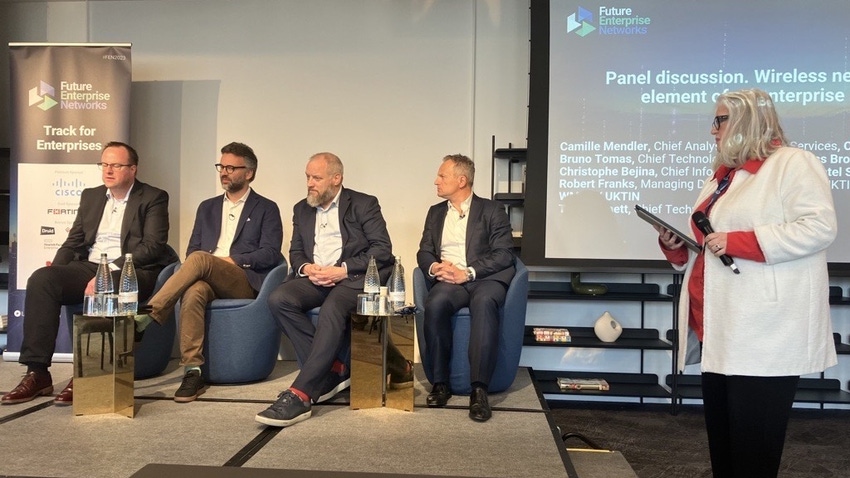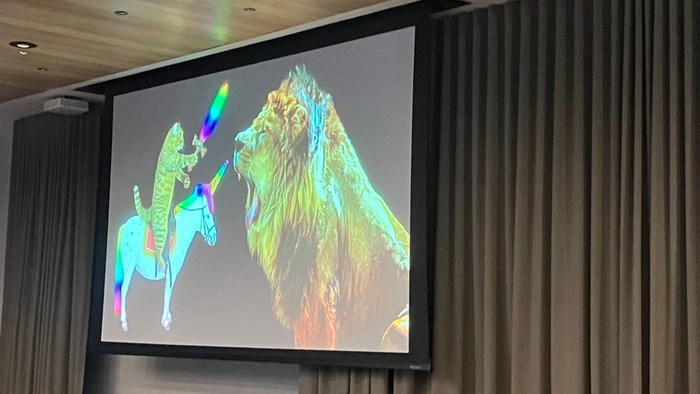Use case stacking is key for private enterprise networks
Ensuring private networks continue to deliver value over their lifetime is crucial to their successful deployment as companies continue to find new ways to implement them.

One of the takeaways from Informa's Future Enterprise Networks event in London this week was the importance of finding the right use cases. Those are needed to justify the investment and allow projects to be scaled up and continue to deliver value.
During a panel on automation hosted by Omdia's Chief Analyst Camille Mendler, West Midlands 5G's managing director Robert Franks said that most failed digital transformation projects are cancelled because of a lack of short-term benefits.
Tom Bennett, CTO at UK neutral host company Freshwave, echoed the sentiment and said use case stacking is essential to prevent this. That means companies need to make sure a private network can bring benefits early, but that new use cases can be added later. He pointed out that often the hard part is the initial hardware installation, while adding new cases on top of, for example, a neutral host network is less difficult to execute.
Christophe Bejina, CIO of Alcatel Submarine Networks, a Nokia-owned company which holds about a third of the submarine communications market, discussed the company's private network installations at two of its factories earlier in the day. The first was done at an electronics factory in the London borough of Greenwich in 2021, with a more complex manufacturing site in Calais added a year later. The latter network covers numerous buildings spanning 60,000 square meters, as well as a boat loading area a kilometer away from the site. This required 60 cells, Bejina explained, which are a mix of macro, micro and pico cells to ensure coverage is ubiquitous across the premises, including spaces where there are metallic and concrete materials.
The core of the network is located in an onsite data center and based on Nokia equipment. Alcatel is responsible for the management of network and SIM cards and, to some extent, also operates the network, according to Bejina. The majority of critical applications are handled by Alcatel's data center in France, which is operated by Free Pro (a subsidiary of France's Iliad), but there are onsite data centers for the most mission-critical applications, including the core.
The network has become the backbone of the site and will look after all mission-critical functions in future, said Bejina. While Wi-Fi is still available, Alcatel has found it has less need for fiber, which it is not installing at new buildings in Calais.
The main goal of the deployment was to streamline operations on site, with all workers connected to the applications they require at all times, while maintaining data security. With synchronization between all production-cycle operations, workers can focus on executing manufacturing tasks using tablets or smart glasses. Bejina, however, also noted that the 3GPP private network model allows new functionalities to be added as standards develop.

A slide shown by University of Strathclyde's Lead Mobile Networks & Security Engineer, Dr. Greig Paul, to demonstrate the importance of security.
(Source: Tereza Krásová/Light Reading)
While the Greenwich and Calais sites are interconnected, the ability to manage movement from one private network to another through the public one in future is also of interest. Alcatel is also looking into the potential use of non-terrestrial networks, which could be needed aboard cable-laying vessels.
Private 5G, according to Bejina, has been an ideal way to support safety applications at the site, which contains vehicles and equipment that might prove dangerous to staff.
Bejina argued that automation will allow workers to focus on their core duties and reduce stress, as well as the need to carry out non-critical tasks. But other conference attendees also pushed back gently against the idea that automation will always lead to workforce slimming. Robert Franks, managing director of West Midlands 5G, pointed to the mobility sector, where private networks can gather real-time sensor data used for traffic management. That could generate the need for new types of intervention.
Other use cases were also discussed during the day. Silverstone Circuits, which manages a motor-racing track in the UK, is using a private network to measure the impact of events on the climate by gathering data about energy and water consumption and waste generation, said Stephane Bazire, the company's head of business sustainability.
At the same time, the network can also be used to improve connectivity for guests through a neutral host model. Discussions with operators about this are currently ongoing.
Related posts:
— Tereza Krásová, Associate Editor, Light Reading
Read more about:
EuropeAbout the Author(s)
You May Also Like











